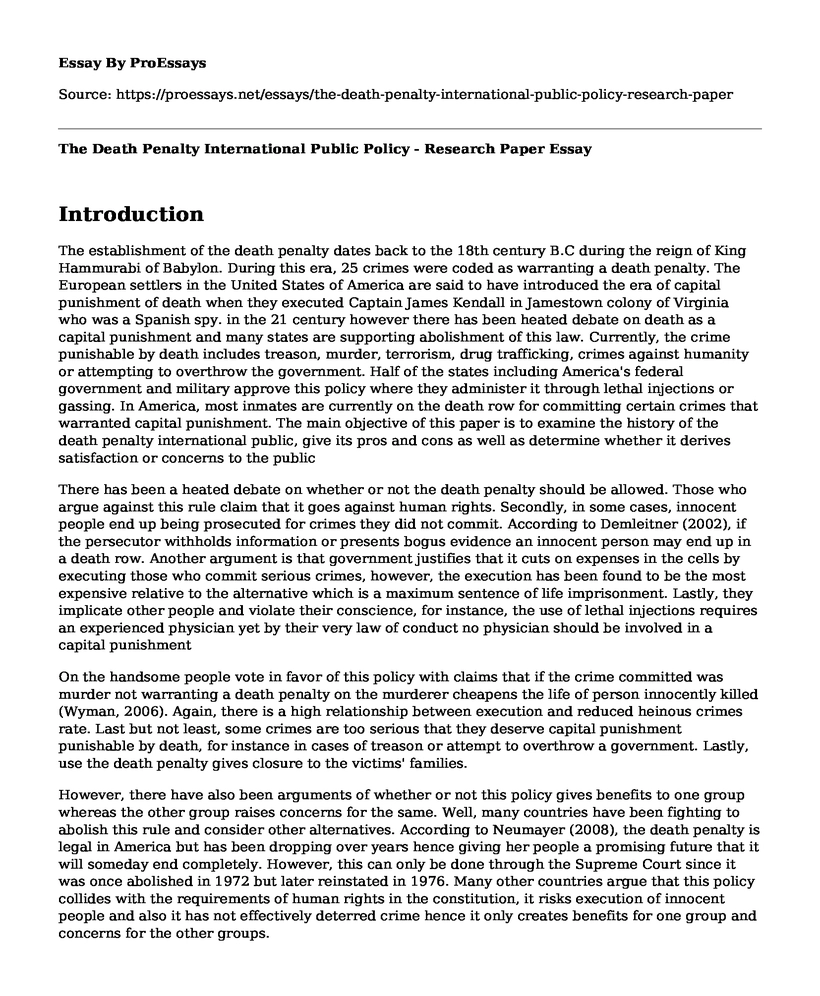Introduction
The establishment of the death penalty dates back to the 18th century B.C during the reign of King Hammurabi of Babylon. During this era, 25 crimes were coded as warranting a death penalty. The European settlers in the United States of America are said to have introduced the era of capital punishment of death when they executed Captain James Kendall in Jamestown colony of Virginia who was a Spanish spy. in the 21 century however there has been heated debate on death as a capital punishment and many states are supporting abolishment of this law. Currently, the crime punishable by death includes treason, murder, terrorism, drug trafficking, crimes against humanity or attempting to overthrow the government. Half of the states including America's federal government and military approve this policy where they administer it through lethal injections or gassing. In America, most inmates are currently on the death row for committing certain crimes that warranted capital punishment. The main objective of this paper is to examine the history of the death penalty international public, give its pros and cons as well as determine whether it derives satisfaction or concerns to the public
There has been a heated debate on whether or not the death penalty should be allowed. Those who argue against this rule claim that it goes against human rights. Secondly, in some cases, innocent people end up being prosecuted for crimes they did not commit. According to Demleitner (2002), if the persecutor withholds information or presents bogus evidence an innocent person may end up in a death row. Another argument is that government justifies that it cuts on expenses in the cells by executing those who commit serious crimes, however, the execution has been found to be the most expensive relative to the alternative which is a maximum sentence of life imprisonment. Lastly, they implicate other people and violate their conscience, for instance, the use of lethal injections requires an experienced physician yet by their very law of conduct no physician should be involved in a capital punishment
On the handsome people vote in favor of this policy with claims that if the crime committed was murder not warranting a death penalty on the murderer cheapens the life of person innocently killed (Wyman, 2006). Again, there is a high relationship between execution and reduced heinous crimes rate. Last but not least, some crimes are too serious that they deserve capital punishment punishable by death, for instance in cases of treason or attempt to overthrow a government. Lastly, use the death penalty gives closure to the victims' families.
However, there have also been arguments of whether or not this policy gives benefits to one group whereas the other group raises concerns for the same. Well, many countries have been fighting to abolish this rule and consider other alternatives. According to Neumayer (2008), the death penalty is legal in America but has been dropping over years hence giving her people a promising future that it will someday end completely. However, this can only be done through the Supreme Court since it was once abolished in 1972 but later reinstated in 1976. Many other countries argue that this policy collides with the requirements of human rights in the constitution, it risks execution of innocent people and also it has not effectively deterred crime hence it only creates benefits for one group and concerns for the other groups.
Conclusion
In conclusion, the death penalty should be abolished as a form of punishment by all the countries in the world. Well, the victims may not fill the same way but there stand more disadvantages of using this rule than in using the alternatives. If many urges that a murderer should not be released back to the people due to high chances of killing g innocent people again then perhaps they should consider the option of maximum security cells with life imprisonment rather than having to take the life of a human being in cold blood in the name of justice.
Reference
Wyman, J. H. (2006). Vengeance Is Whose: The Death Penalty and Cultural Relativism in International Law. J. Transnat'l L. & Pol'y.
Demleitner, N. V. (2002). The Death Penalty in the United States: Following the European Lead. Or. L. Rev.
Neumayer, E. (2008). Death penalty: The political foundations of the global trend towards abolition. Human Rights Review.
Cite this page
The Death Penalty International Public Policy - Research Paper. (2022, Dec 13). Retrieved from https://proessays.net/essays/the-death-penalty-international-public-policy-research-paper
If you are the original author of this essay and no longer wish to have it published on the ProEssays website, please click below to request its removal:
- Is Organized Crime Evolving into a Conventional Business Model Style of Operations?
- Critical Essay on Letter from Birmingham Jail: Equality Movement
- Paper Example on Juvenile Delinquency in the African American Community
- Immigration Act of 2016 Essay
- Essay Sample on Exploring the Causes of a Litigation Explosion in the Courts
- Plain View Doctrine Permits Search & Seizure Without Probable Cause - Essay Sample
- OJJDP Strategies to Address Serious Juvenile Crime - Essay Sample







